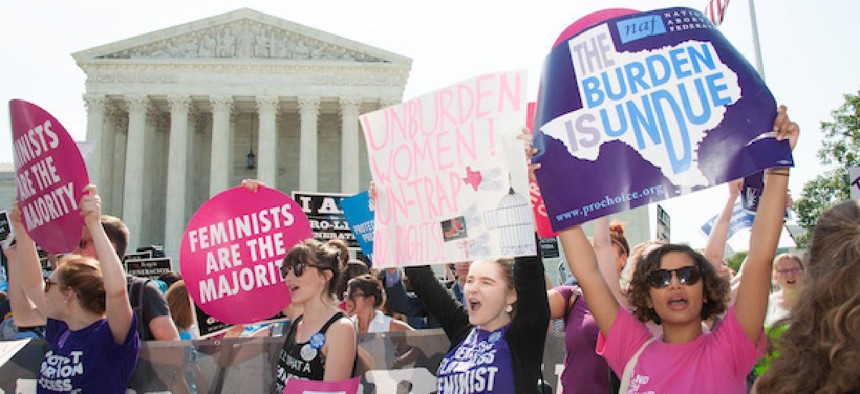The Texas abortion ban and the battle for reproductive rights
Pascale Bernard, vice president of public affairs and organizing at the Planned Parenthood of Greater New York Action Fund, explains what the new law means for women.

Pro-choice protestors rally against abortion restrictions in Washington, D.C. Rena Schild/Shutterstock
On Wednesday, a Texas law went into effect that banned abortions after the six-week pregnancy mark, after the Supreme Court did not act on a request to block it. It is now the most restrictive abortion law in the country.
The law, known as Senate Bill 8, prohibits doctors from performing an abortion if a fetal heartbeat is detected, which tends to occur at six weeks when most women are not even aware that they’re pregnant. While the law doesn’t allow the state to enforce this law, it does provide individuals with the ability to file lawsuits against anyone who “aids and abets” an abortion after six weeks, including those who perform the procedure, abortion clinic staff, counselors, people who might assist in paying for an abortion and even individuals who drive a patient to their abortion appointment.
The bill was signed into law in May, by the state’s Republican governor, Greg Abbott, as a part of growing push among Republican lawmakers to overrule Roe v. Wade, the 1973 Supreme Court decision that made abortion a constitutional right. A slew of women’s reproductive rights organizations and health clinics filed a request to halt the law from going into effect soon after the law passed. While the Supreme Court may still weigh in on the request to halt this law, a lengthy legal battle over its constitutionality and legality are expected.
Pascale Bernard, vice president of public affairs and organizing at the Planned Parenthood of Greater New York Action Fund spoke to NYN Media about how the law threatens the reproductive health of women and Planned Parenthood’s involvement in the fight to overturn Senate Bill 8.
This interview has been lightly edited for length and clarity.
What were your first thoughts upon hearing that Senate Bill 8 went into effect?
One thought was, “Oh my God, what are people going to do in Texas?” And then the other thought was, “Thank God, I live in New York City.” Two very different ends of the spectrum.
How does this new law negatively impact reproductive rights overall?
This is the most prohibitive abortion ban in the country. First and foremost, it bans abortion after six weeks – most people don't know that they're pregnant before six weeks – it also does not allow for any exemptions for rape or incest. It also empowers your neighbor to be a bounty hunter. So the fact that the Supreme Court has turned their backs and have not upheld the law of the land, which is Roe v. Wade. It's very troubling. We are looking at a very difficult and dark day for nearly 7 million women of reproductive age and everybody that supports access to safe legal abortions.
What implications does such a restrictive abortion law have for people in New York, if any?
Well, in New York – which is why my polar opposite thought this morning was, “Thank God I live in New York State” – we do have the Reproductive Health Act, which was passed in 2019. What RHA does is it codifies Roe v. Wade in our state, so people have protection. And people who are seeking compassionate health care can come to one of the Planned Parenthood medical centers throughout the state and get that care. It also makes New York a beacon and a safe haven for people in states such as Texas and so many other states that are passing abortion bans. We as New Yorkers are in a position to provide assistance, to provide compassionate health care and really be a leader in this area. And if it were not for the wonderful work of the state Senate and Assembly, we would not have RHA.
How can New York-based reproductive rights organizations, such as Planned Parenthood, aid people affected by this law?
We're going to continue to provide the compassionate healthcare that we always do. Additionally, our doors are always open, not only do we provide abortion care but we provide a variety of other sexual and reproductive health services for New Yorkers. We are also raising our voice in support of the people in Texas, in support of the people impacted in Texas. We are part of the lawsuit against this law, which is clearly a violation. We're in the fight, we’re providing support and providing medical care. If anyone from Texas were to come for access to medical care here, they would receive it.
NEXT STORY: Leader to Leader: Jordyn Lexton